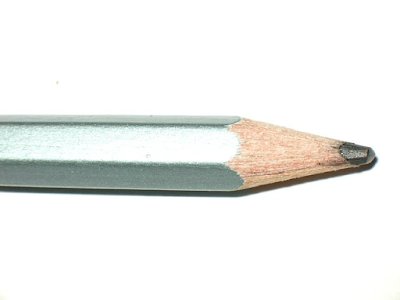It occurs to me that I have a lot in common with a pencil. That’s right – a simple and humble little pencil. Not the fancy mechanical kind. That’s too high-maintenance for me. And I’m not as showy as a plume pen or as smooth as a ball point. I don’t live in bold strokes like a heavy marker. But I’m a lot like a pencil. Here’s how:
1. Like a pencil, I have a built-in eraser. I can correct my mistakes. No, I can't change the past, but I can make it right again. And if I can't erase history (after all, what’s done is done) I can at least erase a great deal of guilt and anger with forgiveness.
2. Like a pencil, I do better if I’m sharpened once in a while. My mind and skills grow dull without occasional honing. Even my spirit and attitudes need refining if I’m to be at my best. And there is something else, too. I find that the difficulties of life wear away at me, and they can either grind me down or shape me into a person who is more capable and creative. The sharpening I get from living through tough times is often painful, but I know it can make me a better person.
3. Pencils work best in a skilled hand. And like a pencil, I can do some pretty terrific things with a little guidance. Other people bring out the best in me, and with the help of others, I can do far more than I ever can alone.
4. Like a pencil, I should leave my mark whenever possible. I too often underestimate my influence on another. I have daily opportunities to leave something good behind. That is what it means to leave my mark. It may be in small ways, it may be in the lives of people I love, people I have touched or nurtured, or even in incidental conversations struck with strangers. But, I have a mark to leave and should use every opportunity to leave something good behind.
5. Like a pencil, it is what is on the inside that matters. A pencil without lead is useless. And a yellow pencil will not do when a black or red pencil is called for. What is on the inside is all important. My outer appearance matters less than I probably think, while it’s the stuff on the inside that folks notice about me. Whether it is understanding or intolerance, love or bitterness, peace or unrest, kindness or self-centeredness, hope or despair, courage or fear, what is on the inside matters most.
6. A pencil works best on paper or canvass. It will never leave its mark on water and will wear itself down against a mirror. I do best knowing my strengths and limitations. I can’t do everything well and that is okay. There is still plenty of good to be done by doing what I do best.
7. And finally, like a pencil, the biggest part of my purpose in this life can be summed up in three words: to be useful. When I’m too broken to hold it together, when everything is ground away or worn down, when I no longer have anything to contribute, I know my life is coming to an end. But until then, my job is to be useful.
Like I said, I have a lot in common with a pencil.
-- Steve Goodier
Image: freeimages.com/John Williams











